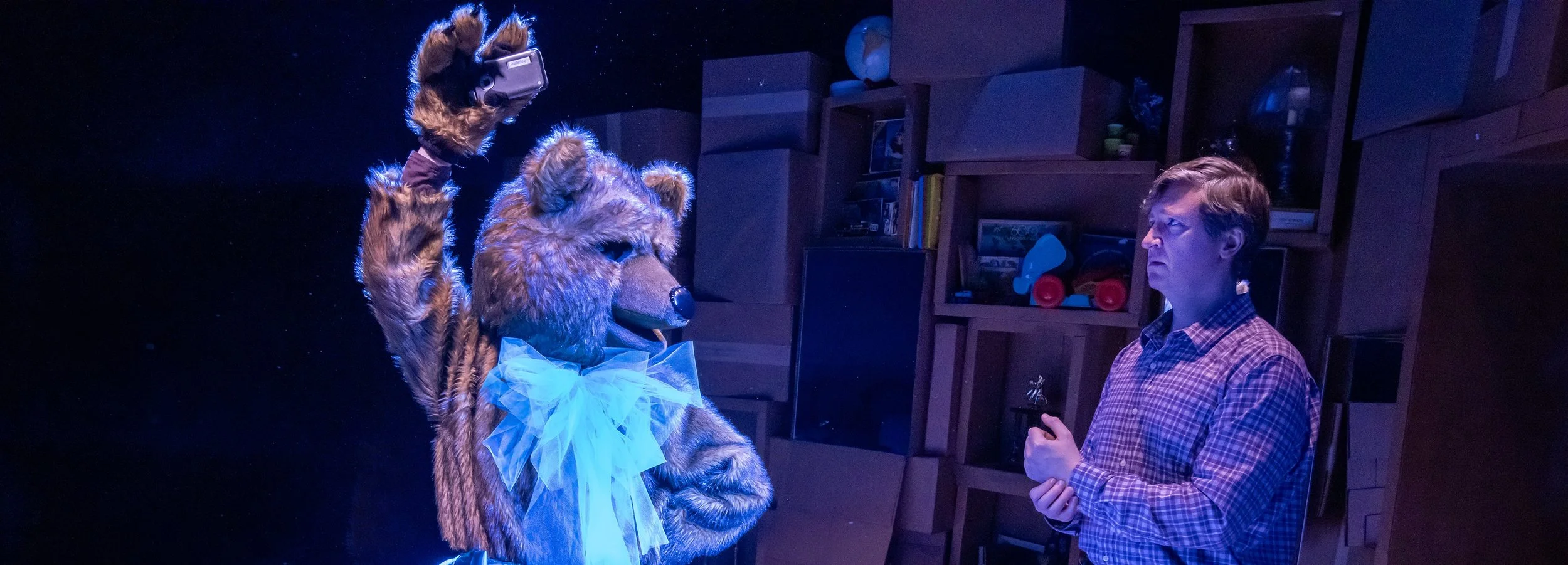For all the theater community’s opposition to Donald Trump, there have been relatively few stage works taking on Trumpism. Amerikin, by Chisa Hutchinson, looks like it could be one during its first half, with its portrayal of “just your white supremacists next door,” but the story heads in a different direction when new characters and themes are introduced in Act II. Though her first act is definitely stronger, Hutchinson overall has crafted an absorbing look at life in these United States.
Mrs. Stern Wanders the Prussian State Library
This production has transferred to the Women’s Project Theater (2162 Broadway at 76th) and will run through Jan. 19. For tickets and more information, visit mrssternwanders.com.
Jenny Lyn Bader’s Mrs. Stern Wanders the Prussian State Library is an intellectually stimulating and profoundly moving historical drama currently running at 59E59 Theaters. Directed by Ari Laura Kreith, and inspired by real events, the play is a compelling portrait of a young Gestapo officer who arrests a graduate student suspected of illegal research.
The Light and the Dark
Artemisia Gentileschi, the real-life subject of Kate Hamill’s uneven new drama The Light and the Dark, survived rape and a harrowing experience at her assailant’s trial to become the most accomplished female painter of the Renaissance. While Hamill’s approach to telling Gentileschi’s life story is ill-conceived in places, the playwright understands its power as a triumph over patriarchy.
What Doesn’t Kill You
“Do you all eat grapes?” James Hindman asks, proffering a bowl of green grapes at the outset of his one-man show, What Doesn’t Kill You, directed by Suzanne Barabas, artistic director of the New Jersey Repertory Company, where this show began its theatrical life. And while Hindman perhaps doesn’t want anyone to leap to their feet and grab a grape, this kind of seemingly non-rhetorical question is part of the audience intimacy he develops throughout the piece (and indeed some audience members did call out at various prompts, though no one took a grape). Hindman’s friendly, casual style establishes rapport, and once everyone is comfortable, he becomes a tour guide on his personal journey into and out of a New Jersey hospital, after suffering the kind of heart attack that one nurse refers to as the “widow maker.”
Lorenzo
Ben Target’s solo show Lorenzo is an end-of-life comedy that is both joyful and surprising. Written and performed by Target (pronounced Tar-ZHAY), and directed by Adam Brace and Lee Griffiths, it is an autobiographical 65 minutes that focuses on a time when Target gave up his work as a comedian to become a live-in caretaker for an aging family friend, “Uncle” Lorenzo Wong.
Ibsen’s Ghost
Charles Busch has frequently used old films as fodder for his comedies: Red Scare on Sunset, Shanghai Moon, and The Lady in Question all draw on silver-screen melodrama for a knowing send-up of Hollywood tropes. But his latest play, Ibsen’s Ghost, is a marked change. Busch has steeped himself in the life of Norwegian playwright Henrik Ibsen and fashioned both facts and fiction into a charming and funny Improbable Biographical Fantasy, as he calls it.
The Slow Dance
Fans of David Letterman may recall when he used to send a costumed staffer out to New York streets for stunts like “Can a Guy in a Bear Suit Hail a Cab?” and “Can a Guy in a Bear Suit Get into a Strip Club?” As in those sketches, someone wearing a bear costume makes incongruous appearances during The Slow Dance by Lisi DeHaas—except this time the question is “Can a person in a bear suit liven up an emotionally and narratively deficient drama?”
The Christine Jorgensen Show
Much of the audience at The Christine Jorgensen Show seemed to be, as the phrase goes, of a certain age, and maybe that’s understandable. Who under 60 knows who Christine Jorgensen was? Yet for a time in the 1950s she was, as a character says in Donald Steven Olson’s play with music, “one of the most famous human beings in the world.”
Adrift
This time of year it may seem that every holiday tradition from around the world has been commodified in the United States, but one that hasn’t caught on is the British panto, a comic family entertainment widely produced throughout the U.K. at Christmastime. Happenstance Theater, the Washington, D.C.–based troupe behind Adrift, doesn’t name panto as one of the many influences on its quirky and clever show, but there are similarities: a vaudevillian essence, British accents, physical comedy, musical interludes, commedia dell’arte–type characters, audience participation, elaborate costumes, a touch of the ribald.
Monsieur Chopin
Hershey Felder, the pianist and actor who has embodied musicians such as George Gershwin and Ludwig van Beethoven in previous shows, is Fryderyk Chopin in his latest stage biography, Monsieur Chopin, directed by Joel Zwick. In the script he has written, Felder climbs into the skin of Chopin, and reveals both the highs and lows of the 19th-century Polish pianist-composer’s life and career.
Cross That River
Fact marries fiction in the new musical Cross That River, a tale about a runaway named Blue who escapes slavery in the 1860s to become one of America’s first black cowboys. Soulfully directed by Reggie Life, and starring jazz musician Allan Harris, Cross That River has music and lyrics by Harris, and a book written by Harris and his wife, Pat Harris. Although its musical patterns are mostly defined by a spirited jazz and blues vibe, there are also dashes of gospel, country and western, and African rhythms that pulsate in the vibrant songs.
A Eulogy for Roman
Going to a solo show that is set up as a memorial service might not sound like a particularly inviting theatrical experience during the dog days of summer. But A Eulogy for Roman, written and performed by the beguiling Brendan George, proves that saying farewell to a childhood friend doesn’t have to be an occasion for tears but can be a time for making new promises.
Invisible
Nikhil Parmar’s relentlessly kinetic solo show Invisible is an impressive hourlong workout for the actor. The words tumble out, the situations are plentiful, and he breaks the fourth wall time and again. If he had not written the piece for himself, one might regard the movement as a mistake by a novice, but Parmar intends to show what he can do, vocally and physically, and with a vengeance.
Foxes
Foxes, set in a Black Caribbean community in London, is a sly and thoughtful exploration of a series of taboo subjects. Meera (Nemide May), who is from a Muslim family, tells her boyfriend Daniel (Raphel Famotibe), who is from a Caribbean Christian family, that she is pregnant. That creates a big problem: how will these two young people, from different cultural and religious backgrounds, work it out? They are also at the beginning of their young adult life, trying to determine their future. Daniel is planning on going to university, or “uni” as the Brits call it.
Orlando
At the outset of Orlando, playwright-performer Lucy Roslyn says she discovered Virginia Woolf’s 1928 novel (also titled Orlando) at a “jumble sale” when she was 12. Roslyn, from England’s West Midlands, explains that a jumble sale is what Americans call a yard sale. She also mentions that hers is a Coventry accent and that Woolf’s Orlando, in successive editions, has been a treasured companion since she bought that flea-market paperback years ago.
Día y Noche
Día y Noche is a dynamic, energy-filled new play by David Anzuelo that chronicles the lives of two teenage boys, Danny Guerrero and Martin Leonard Brown, growing up in El Paso, Texas, during the 1980s. Danny (Freddy Acevedo) and Martin (Neil Tyrone Pritchard) are polar opposites, yet their friendship is one of the best relationships they could have imagined.
Peerless
This young Off-Broadway season has already seen two new plays riffing on Macbeth, both written and directed by women and both having to do with college. Sophie McIntosh’s Macbitches, which wrapped its run at the Chain Theatre a month ago, was set in a university theater department that’s shaken up when a freshman wins the role of Lady Macbeth instead of the star senior. And now Primary Stages has debuted Peerless, Jiehae Park’s fast-talking dark comedy about Asian American siblings hell-bent on getting into the most prestigious university.
On That Day in Amsterdam
On That Day in Amsterdam begins on a morning in 2015, after two young men have hooked up at a dance club in the Dutch metropolis. One of them, Kevin (Glenn Morizio), an American of Filipino extraction, is impatient to depart: he has a flight back to America later in the day, and he feels no emotional connection. The other, Sammy (Ahmad Maksoud), hopes to know Kevin better and nudges him to have breakfast. A heavy snow delays Kevin’s trip, and what ensues in Clarence Coo’s emotionally reverberating play expands to far more than a gay love story: it is a moving drama about life’s fleeting encounters, loss, nostalgia, home, art, and memory, told in scenes that skip through centuries.
New Golden Age
Time and again, stories about what the future holds for technology and humanity have enthralled audiences—think of the rabid followings for The Twilight Zone and Black Mirror, produced 50 years apart. Playwright Karen Hartman puts forth her contribution to the genre with New Golden Age. But whereas those TV shows grabbed viewers with suspense, plot twists and amusing allegory, New Golden Age mainly offers talking. More than three-quarters of its run time is occupied by one long scene, and it consists mostly of people standing around talking. That tedium outweighs any emotional reaction that Hartman’s Facebook-run-amok scenario may elicit.
Whisper House
After all those months with no live performance, it’s heartening not only to have theaters back up and running but also to see companies picking up right where they left off. Like the Civilians, who are finally getting to mount the New York premiere of Whisper House. The show had been set to begin performances of the Duncan Sheik/Kyle Jarrow musical on the very day in March 2020 when all theater was shut down.


























